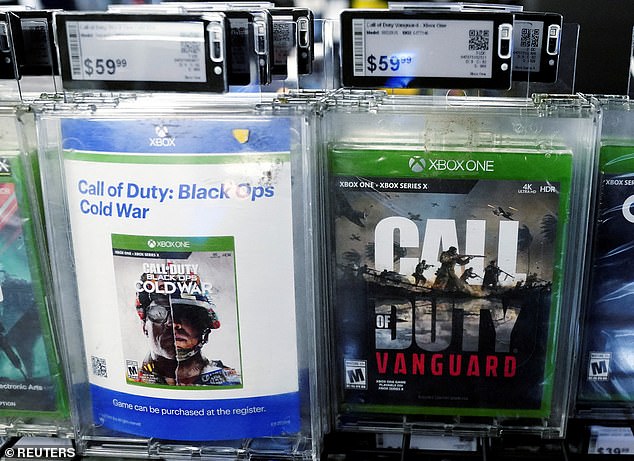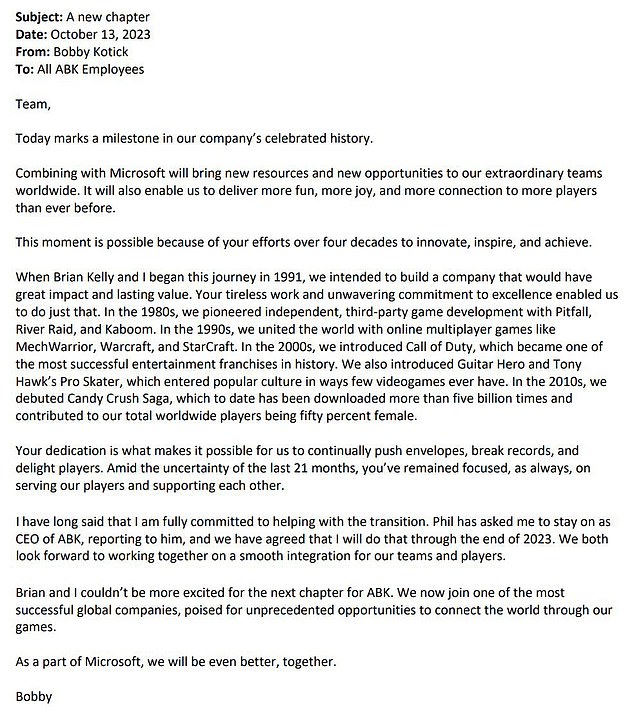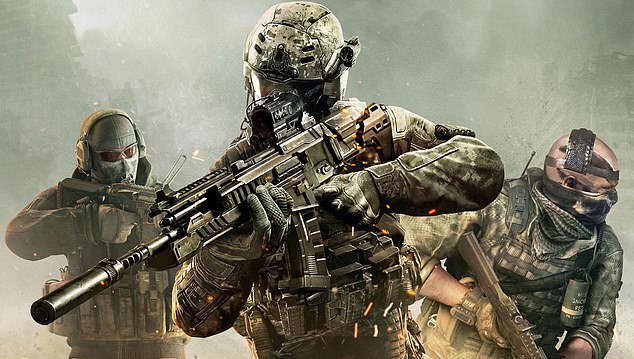Microsoft closes $69 billion acquisition of gaming giant Activision Blizzard after nearly 2 years of antitrust battles – pulling off the biggest tech deal in history
Microsoft closes $69 billion acquisition of gaming giant Activision Blizzard after nearly 2 years of antitrust battles – sealing largest tech deal in history
- Microsoft has completed its acquisition of Activision Blizzard after 22 months
- It promised to give Nintendo and Sony access to Activision games for 10 years
- Activision makes Call of Duty, Crash Bandicoot, Diablo, Overwatch and StarCraft
After nearly 22 months, Microsoft completed its acquisition of video game maker Activision Blizzard for $69 billion — sealing the largest technology deal in history.
The deal faced obstacles around the world, with regulators worried that by owning Activision, which makes games like Call of Duty, Diablo and Overwatch, Microsoft could limit its games to its own Xbox platform.
Industry rival Sony expressed concern that Microsoft could block major games from being available on the PlayStation.
But the completion of the deal came seven hours after Microsoft won final approval from a UK antitrust watchdog, reversing its earlier decision to block the takeover.
The Activision acquisition could ultimately boost Xbox sales, as Microsoft has plans to fold Activision titles into its ‘Game Pass’ subscription service, which works like Netflix for video games. In 2020, it acquired another major gaming studio, Bethesda.

Regulators in the US and UK were concerned that by owning Activision – the maker of Call of Duty, Diablo and Overwatch – Microsoft could limit its games to the proprietary Xbox platform. Pictured are Call of Duty games in a store in Manhattan, New York

Phil Spencer, CEO of Microsoft’s Xbox division, said on Friday that users of other consoles will retain access to Activision titles. He is pictured outside a federal court in June
On Friday morning, trading in Activision Blizzard stock was halted following the acquisition. Shareholders were to receive $95 for each share they owned before the closing.
Phil Spencer, chief executive of Microsoft’s Xbox division, said on Friday: ‘Whether you play on Xbox, PlayStation, Nintendo, PC or mobile, you’re welcome here – and will stay welcome, even if Xbox isn’t where you live. favorite franchise is not playing .’
Microsoft has long defended the deal as good for gaming, saying its goal was to get Activision games to more people on more platforms rather than trying to take those games away from console makers like Sony and Nintendo.
‘Players have always been at the center of everything we do. And as we grow, we’ll continue to keep players at the heart of it all,” Spencer said.
A key element of the deal is that Microsoft agreed to give the distribution rights of Activision games to French game publisher Ubisoft.
It also appeased Sony and Nintendo by signing agreements promising that Call Of Duty games – the jewel in Activision’s crown – would be available to their users for 10 years after the deal went through.
In July, Microsoft won the right to close the buyout of Call of Duty game maker Activision Blizzard in the US after the Federal Trade Commission (FTC) tried to block the deal.
The FTC had also hoped to block the takeover over fears that it would stifle competition and prevent access to games for consumers.

Activision Blizzard CEO Bobby Kotick said in a memo to employees on Friday that he will stay on as CEO until the end of 2023

Microsoft has committed to making Call of Duty available on PlayStation for the next ten years. Pictured is Call of Duty promotional material
But Judge Jacqueline Scott Corley dismissed the claims, saying: ‘To the contrary, the record evidence points to increased consumer access to Call of Duty and other Activision content.’
In the short term, gamers are unlikely to see a change in the availability of popular Activision Blizzard titles, but well into the future, things are more uncertain.
The Ubisoft deal that will see the French company hold streaming rights for the Activision titles has been signed for 15 years, but it’s unclear what Microsoft might do after that.
